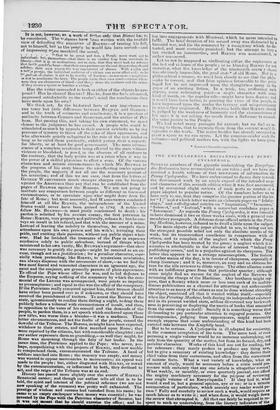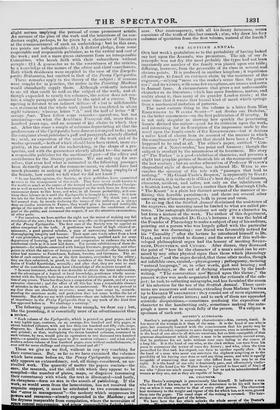THE ENCYCLOPEDIA ARITA NNIC A—THE PENN CYCLOPEDIA.
SEVERAL numbers of that gigantic undertaking the Encyclope- dia Bcitannica have accumulated on our table ; and we have also
received a l■mrth volume of that microcosm of information the
Penny Cyclopevdia. We have endeavoured to do our duty towards the first-named work by an ample expose of the intended scope
and character of this seventh edition when it was first announced, and by occasional slight reviews of such parts as contain .:(1 a paper adapted to popular notice. Of the numbers before us we
have only to say, that they comprise the greater portion of the let- ter "I ;" under which letter we note an elaborate paper on " Ichthy- ology," and well-digested articles on " Inquisition," "Insurance, "Interest," and "Ireland," with a somewhat credulous paper on " Interment." As regards the Penny Cyclopedia, it was intended to have dismissed it two or three weeks since, with a general com- mendatory paragraph. A dolorous demi-official article in the Print- tug Machine, however, induced us to dwell a little upon the subject. The main objects of the paper alluded to are, to bring out into the strongest possible relief not only the absolute merits of the work, but its transcendent excellence in comparison with all others, and to complain of the neglect with which the Penny Cyclopcedia has been treated by the press; a neglect which it in- sinuates is attributable to the absence of interest "behind the publishing-scenes," and to a prejudice against its cheapness. This latter idea appears to us a strange misconception. The fashion, or rather mania of the day, is in favour of cheapness, especially of cheap literature ; and it is, moreover, an easy and an obvious fea- ture for the idle reviewer to dilate upon. The other allusion comes with an indifferent grace from that particular quarter ; although some might find an excuse for the neglect of the Reviews by reversing the charge of the Machiner. Our brethren might sup- pose, that a Society which more or less uses each of its multitu- dinous publications as a channel for attracting not unfavourable attention to as many of the others as can be done without obtruding the object, combined all that it wanted within itself,—especially when the Printing Machine, both during its independent existence and in its present wedded state, seldom discovered any backward- ness in perceiving or displaying the merits of books that emanated from the same shop as itself.* Socially it is something worse than ill-breeding to pay particular attention to engaged persons. Our contemporaries, judging from appearances, might reasonably enough suppose that some understanding of this kind had been entered into between the Knightly band. But to be serious. A Cyclopedia is ill-adapted for reviewing, in the common acceptation of the term. The mere task of even perusing a single volume would be an immense undertaking, not only from the quantity of the matter, but from its formal, dry, and peculiar character. Works of this kind are not for reading, but for reference : they rarely profess to produce any thing new, but to give a summary of existing knowledge - they derive their chief value from their correctness, and often from the correctness of minute facts. What a vast variety of knowledge, what an amount of study, would be necessary before a critic could pro- pounce with certainty that any one article is altogether correct! What weekly, or monthly, or even quarterly journal, can afford the mighty machinery necessary for the purpose of reviewing one single volume of an Encyclopaedia! If they had it, what would it end in, but a general opinion, aye or no; or in a minute enumeration of particulars, which scarcely any reader would pe- ruse ? Fully and carefully to review such a work, would require as much labour as to write it ; and when done, it would weigh down the review that attempted it. All that can fairly be required In re- spect to such an undertaking, from the literary indicators of the slight notices implying the perusal of some prominent article. An account of the plan of the work and the intentions of its con- ductors ought, perhaps, to be given by a chronicler of literature at the commencement of such un undertaking : but in this case, two points are indispensable—(L) A distinct pledge, from some respectable and responsible publisher, as to the extent and cost of the work ; and not a mere guess statement from an irresponsible Committee, who break faith with their subscribers without scruple : (2.) A guarantee as to the correctness of the articles, by a knowledge of the names of the editor and chief contributors. Both which desiderata were supplied in the case of the Encyclo- peedia Britannica, but omitted in that of the Penny Cyclopedia.
These remarks apply to the theory of the subject : if reasons were sought for in practice, the notiee in the Printing Machine would abundantly supply them. Although evidently intended to say all that could be said on the subject of the work, and al- though expanded to nearly ten columns, the notice does not con- tain a. single paragraph animated by the spirit of a review. The opening is devoted to an indirect defence of w hat is iddefensible —a statement that the whole work should be completed in about eight volumes; whereas letter " A" and the half of letter " B" occupy four. Then follow some remarks—querulous, but not unamusing—on what the Acadienie Franeaise did, more than a hundred years ago, and an account of the chairs in which they- sat. After this come a- couple of columns depreciating all that the predecessors of the Cyclopedia have done or attempted to do ; next, the complaint about publisher's puff and paragraph, already alluded to; • next, an exposition of the machinery of the work and of its onodus operandi,—both of which should have been stated, more ex- plicitly, at the outset of the undertaking, in the shape of a pro- spectus, and with the guarantees already alluded to—the name of a responsible publisher for the mechanical part—of the editor and contributors for the literary portions. We can only say for our- selves, that even had what is intimated in the following passages been distinctly stated at the commencement, we should have had much pleasure in making it public; but not being employers of the Society, how could we tell what we did not know ?
" In our bumble opinion, the Society, or their publisher. have committed an error in the management of this work. They have never made known to the world so much as the names of the learned and accomplished men (foreign- ers as well as natives), who have been engaged on the work from its first com mencement down to this hour, and who, in all human probability, will con- tinue their labours in it until the Cyclopedia is brought to a close. Is it now too late for the Society to make some such disclosure ? We think not ; and feel assured that, by merely declaring the names of the authors, as is always done on similar occasions in France, they would give a broad and intelligible pledge of the merits of the work, and thereby increase the confidence of one part of the public, and command the respect, if not the attentive examination, of other parts.
" For ourselves, we have neither the right nor the means of making any full revelation of the sort ; but a few words we may offer on the general management of the Penny Cyclopedia. The first care of the Society was to appoint an editor competent to the task. A gentleman was found of high classical at- tainments, a good general scholar, a man of unwearying industry, and of thoroughgoing integrity and honour. Their next care was to select from a host of vain pretenders, a proper number of contributors, qualified each for some department of learning, and by union and cooperation to embrace the whole intellectual circle as it is now laid down. For certain subdivisions of these de- partments—for subjects connected with foreign literature, geography, and other points in which the natives of foreign countries have excelled—the Society and editor had recourse to Frenchmen, Italians, Swedes, and Germans. The ar- ticles of each contributor are, in the first instance, overlooked by the editor ; they are then submitted, in proof, to the members of the Society fur the Dif- fusion of Useful Knowledge, severally ; and after that, they are sent to such other of the contributors as may have a knowledge of the matters treated of.
" In some instances, where it was desirable to obtain the latest information, and the advantages of a topical or local knowledge, gentlemen wholly uncon- nected with the Society have been referred to for information, or for the correc- tion of any errors. There has thus been a cooperation of the purest, and of a very extensive character ; and the effect of all this has been a remarkable absence of mistakes in the work. Let us not be misunderstood. We do not pretend to say that there are absolutely no errors; some may have crept in, notwith- standing the exertions made, and perfection does not come within the lot of humanity. But this we say with confidence—there are infinitely fewer errors of importance in the Penny Cyclopedia than in any work of the kind that has appeared before it. We challenge a scrutiny."
The following passage also is true enough, we dare say ; but, like the preceding, it is essentially more of an advertisement than a review.
" Each volume of the Cyclopedia, which is printed on good paper, and in a very legible type, contains, on an average, five hundred and fifty pages, or eleven hundred columns, with not less than one hundred and fifty cuts, maps, diagrams, &c. Each column is about equal to two octavo pages, as books are now printed ; so that, multiplying the eleven hundred columns, contained in each volume, by two, would give an equivalent to two thousand two hundred pages,—a quantity more than equal to five modern volumes : and what single modern octavo volume of four hundred pages, even without embellishments, is ever sold for seven shillings and sixpence, bound and all ? "
These we give as we find, without in any way vouching for their correctness. But, so far as we have examined the volumes which have come before us, the Penny Cyclopedia unquestion- ably appears an extraordinary, and, all things considered, an un- rivalled work. The quantity of matter the papers contain—the care, the research, and the skill with which they appear to be compiled—tbe number of plates, maps, or diagrams (assuming their correctness) with which the text is illustrated—and lastly, its cheapness—form an tetra in the annals of publishing. if the work, as would seem from the lamentation, has not received the requisite support, it must be attributed to two circumstances : the "error in management"—the modesty which suppresses its rowers and resources—already expounded in the Machine; and he dryness inseparable from compilation, where the necessities of 3 ee coin 1
ness. Our contemporary, with all his funny fierceness, seems conscious of the truth of this last remark ; else, why draw his four columns of quotation from the first volume, instead of the fourth?



























 Previous page
Previous page